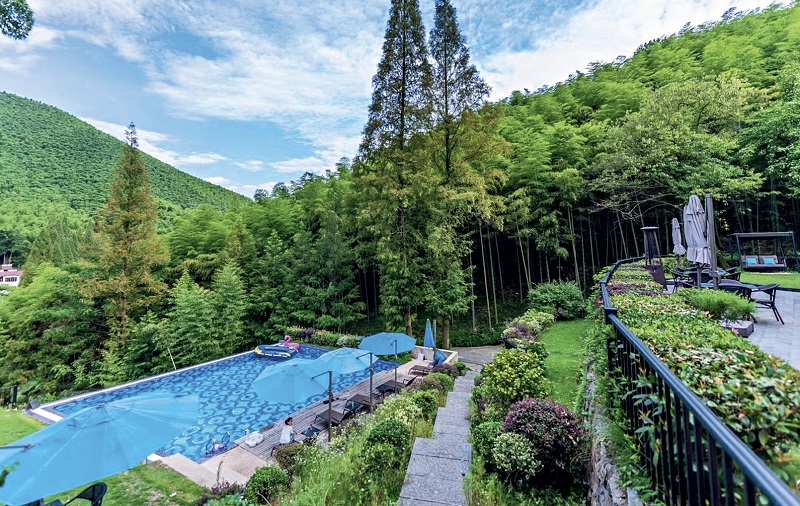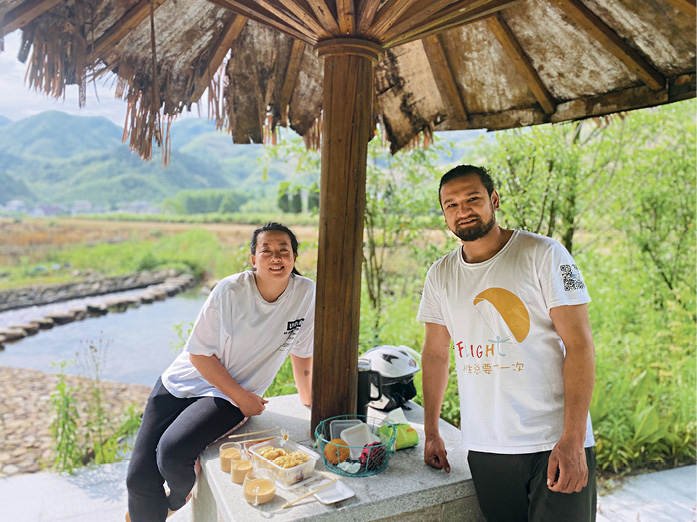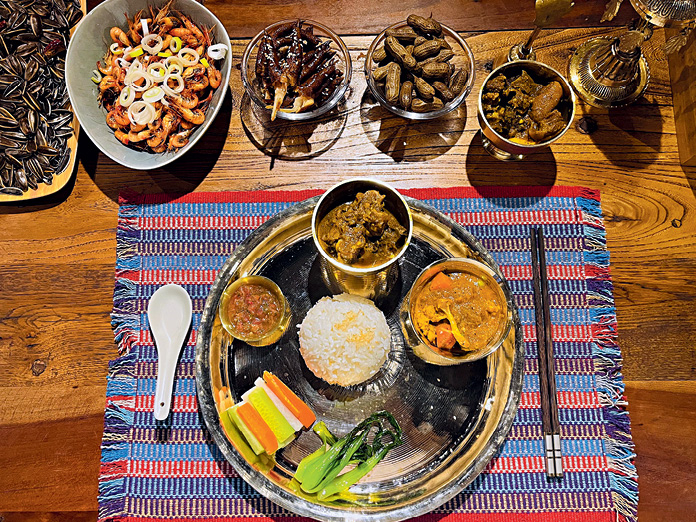Unique guesthouses are popular in China’s Mogan Mountains, including many owned by foreigners.

The natural environment of Arcadia Resorts Moganshan presents a refreshing wonderland.
July is the annual peak season for hospitality businesses in the Mogan Mountains, located in Deqing County of east China’s Zhejiang Province, as the mountain region is one of the major places in China where people go to escape the summer heat.
Bishal Thapa hails from Nepal. A silver medalist in the men’s paragliding at the 2018 Asian Games, he now owns a B&B called “Zhuying Shanju,” literally meaning the mountain residence under bamboo shadows, in the Mogan Mountains. This summer, its occupancy rate exceeded 80 percent. “I feel both exhausted and happy,” he said because he works as a paragliding coach during the daytime and cooks Nepali food for customers in the guesthouse at night.

Bishal Thapa and his wife in their B&B guesthouse in Moganshan.
 Foreign Bosses in Mogan Mountains
Foreign Bosses in Mogan Mountains Zhuying Shanju is a latecomer to the circle of foreign-operated guesthouses in Deqing. In 2020, Bishal Thapa and his Chinese wife decided to settle down there and later opened a B&B. Gradually, Bishal Thapa learned Chinese and cooked some Nepal meals in the guesthouse.
The couple enjoyed entertaining guests and opened up a tiny restaurant in the B&B, which can seat up to over 20 persons. People gather there to eat, drink, and chat, and some even enjoy reciting poems about love. His wife believes she has found “the way to love and enjoy life” in the Mogan Mountains.
You may wonder what is it about the Mogan Mountains that attracts Bishal Thapa as a professional athlete? He indicated that it is the popularity of local foreign-funded guesthouses together with the stunning scenery in the Mogan Mountains that really impressed him. “This place is very similar to the rural environment of Nepal where I grew up. The bird’s-eye view of the bamboo forest here is also very amazing,” Bishal Thapa said. In his opinion, the rural hustle and bustle at the foot of the Mogan Mountains is suitable for young people.
Another B&B in the area, Arcadia Resorts Moganshan, was invested in and founded by seven business partners, three of whom are foreigners. Its founder Ernest Guan said designing a comfortable environment was their top priority in building Arcadia. “Our idea was to build it as a home rather than a hotel so visitors can truly relax here,” he said.
There is no special fragrence or front desk in Arcadia, instead there is lots of public space for guests to communicate with others. The decorations of this eco-hotel reflect the bamboo forest and waters located outside the hotel door, presenting a refreshing wonderland. Inside each room, sunshine, breeze, and bamboo are all literally at the fingertips of guests once they open the floor-to-ceiling windows.
Another business partner Steven Weathers has lived in Canada for many years. He said many of the customers are Chinese university students who are studying abroad. “When they visit here with their parents, they say it feels like taking a short trip to a foreign country. Coming here to relax has become part of their lives.”
Arcadia Resorts Moganshan features healing, relaxing, and coming close to nature. “Every year, I take some time to relax here for a while with my friends. It reminds me of rural Canada,” Steven said. Their hotel is perfect for individuals looking for a quiet place to stroll, read, play cards, swim in nature, or practice yoga by the pool.
Unlike much of tourism in the past which seeks to cater to tourists who crowd Internet-famous attractions, guesthouses owned by foreign bosses in the Mogan Mountains focus on people’s need to enjoy a comfortable travel experience with companions. According to local tourism authorities in Deqing County, there are around 10 types of such guesthouses in Deqing.

The Nepali dinner Bishal Thapa made for the guests.
“Tuscany of the East”
Data show that the annual average temperature in the Mogan Mountains is 13.3oC. Even in the hottest days of the year during July and August, temperatures here are below 25oC, 8-10oC lower than that at the foot of the mountains. While surrounding cities experience relentless heat waves, this natural cool feature of the Mogan Mountains has become a major attracting point for many tourists.
The growing popularity of the Mogan Mountains is closely linked to China’s connections with the rest of the world. After Shanghai’s forced opening-up in 1843, the Mogan Mountains became a favored holiday destination for foreigners. In 1896, the Western-style Belle Villa was built there, becoming the first villa of its kind beating the heat built by Westerners in China. Since then, many Westerners have visited the Mogan Mountains and built buildings after those in their hometowns, leaving over 200 different styles of villas. As a result, people have hailed this place “Tuscany of the East.”
Back in 2007, a man from South Africa who gave himself the Chinese name Gao Tiancheng hiked across the Mogan Mountains and was deeply attracted by its landscape. He founded a series of eco-resorts. Later, people from over 10 countries, including France, Britain, and Russia, came here to open up their own guesthouses. Even though the cost of staying one night is high (starting at RMB 1,500) here, tourists from home and abroad still come in droves. The peaceful sounds of nature and unique scenery have made them popular among tourists from all over the country.
The presence of foreign-run guesthouses does not hamper the development of local B&Bs. In 2003, the implementation of a rural revitalization program in the Mogan Mountains significantly improved the local living conditions. More and more young people have begun to return to their home villages and renovate old houses into guesthouses with distinctive styles, gradually forming a “Mogan Mountains Guesthouse Cluster.”
Several small plots of land can be seen scattered throughout the rolling mountains. Local villagers build homes there and run B&Bs surrounded by mountains and waters. This is how Chinese people live in nature in the Mogan Mountains. As of now, there are over 800 registered B&Bs in Moganshan Town.
The prosperous development of both guesthouses run by foreigners and those of local farmers have contributed to the strong growth of local tourism. In 2021, the town received 2.52 million tourists, generating a revenue of RMB 2.23 billion.
Bishal Thapa has witnessed the changes that have taken place in the Mogan Mountains over the past few years. Before opening his business, Bishal Thapa was pursuing a career in the field of paragliding. Now, his B&B has accumulated many regular customers. “They all feel the mountains and waters here are fabulous, and our guesthouse is unique. They don’t want to leave once they come here.”
For Bishal Thapa and his wife, keeping their home and running the guesthouse is not merely a job but a career that they enjoy and find pursuing it worthwhile. Nowadays, there are many other foreigners like Bishal Thapa in the Mogan Mountains. They operate guesthouses, enjoy the scenery, and entertain guests from across the world. 
HU FENGSHENG is a reporter at China News Service.